Climate change denial
The executive director of the Society of Environmental Journalists said that while there was reasonable skepticism about specific issues, she felt that "denier" was "the most accurate term when someone claims there is no such thing as global warming, or agrees that it exists but denies that it has any cause we could understand or any impact that could be measured".Chris and Mark Hoofnagle have defined denialism in this context as the use of rhetorical devices "to give the appearance of legitimate debate where there is none, an approach that has the ultimate goal of rejecting a proposition on which a scientific consensus exists."Scientists rejected his assertions; the presidents of the American Meteorological Society and University Corporation for Atmospheric Research described his claims as part of a "systematic effort by some individuals to undermine and discredit the scientific process".[75] The Great Global Warming Swindle is a 2007 British polemical documentary film directed by Martin Durkin that denies the scientific consensus about the reality and causes of climate change, justifying this by suggesting that climatology is influenced by funding and political factors.It argues that the consensus on climate change is the product of "a multibillion-dollar worldwide industry: created by fanatically anti-industrial environmentalists; supported by scientists peddling scare stories to chase funding; and propped up by complicit politicians and the media".He cited Ted Nordhaus and Michael Shellenberger of the Breakthrough Institute, and also Roger A. Pielke Jr., Daniel Sarewitz, Steve Rayner, Mike Hulme and "the pre-eminent luke-warmist" Danish economist Bjørn Lomborg.[113] Examples of science-related conspiracy theories that some people believe include that aliens exist, childhood vaccines are linked to autism, Bigfoot is real, the government "adds fluoride to drinking water for 'sinister' purposes", and the moon landing was faked."[131] Jerry Taylor of the Niskanen Center posits that climate change denial is an important component of Trumpian historical consciousness, and "plays a significant role in the architecture of Trumpism as a developing philosophical system".[132] Though climate change denial was apparently waning circa 2021, some right-wing nationalist organizations have adopted a theory of "environmental populism" advocating that natural resources be preserved for a nation's existing residents, to the exclusion of immigrants.Congressman Al Gore was aware of the developing science: he joined others in arranging congressional hearings from 1981 onward, with testimony from scientists including Revelle, Stephen Schneider, and Wallace Smith Broecker."[14] In 2006, George Monbiot published an article about similarities between the methods of groups funded by Exxon and those of the tobacco giant Philip Morris, including direct attacks on peer-reviewed science and attempts to create public controversy and doubt.[178] In a 2017 interview, United States Secretary of Energy Rick Perry acknowledged the existence of climate change and impact from humans, but said that he did not agree that carbon dioxide was its primary driver, pointing instead to "the ocean waters and this environment that we live in".[179] The American Meteorological Society responded in a letter to Perry that it is "critically important that you understand that emissions of carbon dioxide and other greenhouse gases are the primary cause", pointing to conclusions of scientists worldwide.[10] In 2013, the Center for Media and Democracy reported that the State Policy Network (SPN), an umbrella group of 64 U.S. think tanks, had been lobbying on behalf of major corporations and conservative donors to oppose climate change regulation.[190][191] In November 2021, a study by the Center for Countering Digital Hate identified "ten fringe publishers" that together were responsible for nearly 70 percent of Facebook user interactions with content that denied climate change.[192][193] The "toxic ten" publishers: Breitbart News, The Western Journal, Newsmax, Townhall, Media Research Center, The Washington Times, The Federalist, The Daily Wire, RT (TV network), and The Patriot Post.[208] In 2023, the state of Florida approved a public school curriculum including videos produced by conservative advocacy group PragerU that liken climate change skeptics to those who fought Communism and Nazism, imply renewable energy harms the environment, and say current global warming occurs naturally.[210] But some books clouded the human causes of climate change and downplayed the role of fossil fuels, with Texas U.S. Representative August Pfluger emphasizing the importance of "secure, reliable energy" (oil and natural gas) produced in the Permian Basin.[218][219] During a May 2018 meeting of the United States House Committee on Science, Space, and Technology, Representative Mo Brooks claimed that sea level rise is caused not by melting glaciers but rather by coastal erosion and silt that flows from rivers into the ocean.[220] In 2019, Ernesto Araújo, the minister of foreign affairs appointed by Brazil's newly elected president Jair Bolsonaro, called global warming a plot by "cultural Marxists"[221] and eliminated the ministry's climate change division.An April 15, 2023, tweet by Republican U.S. Representative Marjorie Taylor Greene said climate change was a "scam", that "fossil fuels are natural and amazing", and that "there are some very powerful people that are getting rich beyond their wildest dreams convincing many that carbon is the enemy".[163] In their book Merchants of Doubt, the authors write that Seitz and a group of other scientists fought the scientific evidence and spread confusion on many of the most important issues of our time, like the harmfulness of tobacco smoke, acid rains, CFCs, pesticides, and global warming.[235] Between 1989 and 2002, the Global Climate Coalition, a group of mainly U.S. businesses, used aggressive lobbying and public relations tactics to oppose action to reduce greenhouse gas emissions and fight the Kyoto Protocol.The New York Times reported, "even as the coalition worked to sway opinion [toward skepticism], its own scientific and technical experts were advising that the science backing the role of greenhouse gases in global warming could not be refuted".[247] From 1989 till April 2010, ExxonMobil and its predecessor Mobil purchased regular Thursday advertorials in The New York Times, The Washington Post, and The Wall Street Journal that said that the science of climate change was unsettled.On 8 February 2024, Mann won a $1 million judgment for punitive damages in a defamation lawsuit filed in 2012 against bloggers who attacked his hockey stick graph of the Northern Hemisphere temperature rise.[252][253] After Elon Musk's 2022 takeover of Twitter (now X), key figures at the company who ensured trusted content was prioritized were removed, and climate scientists received a large increase in hostile, threatening, harassing, and personally abusive tweets from deniers.[127] One of the authors' main arguments is that most prominent scientists who have opposed the near-universal consensus are funded by industries, such as automotive and oil, that stand to lose money by government actions to regulate greenhouse gases."[310] Jerry Taylor promoted climate denialism for 20 years as former staff director for the energy and environment task force at the American Legislative Exchange Council (ALEC) and former vice president of the Cato Institute."[314] Bob Inglis, a former US representative for South Carolina, changed his mind in around 2010 after appeals from his son on his environmental positions, and after spending time with climate scientist Scott Heron studying coral bleaching in the Great Barrier Reef.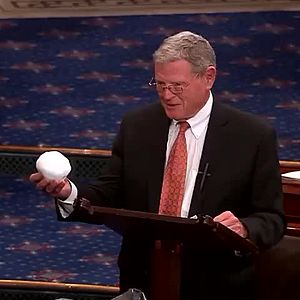


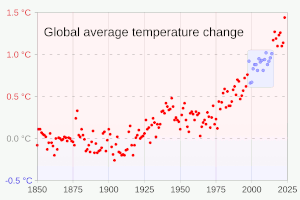

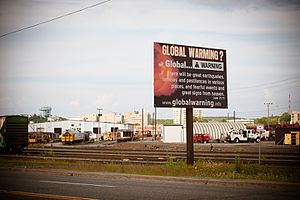
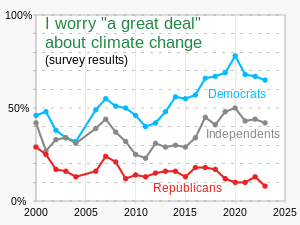
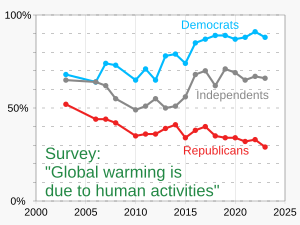
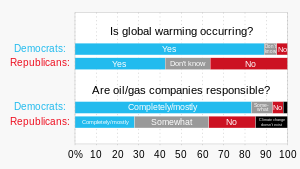

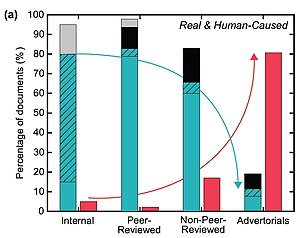
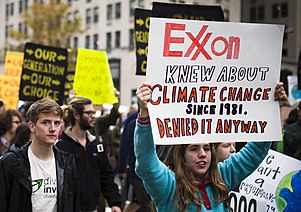

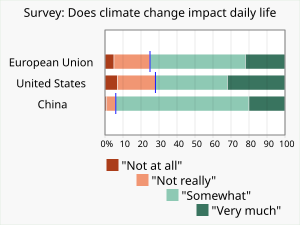
U.S. SenateJim InhofeGoddard Institute for Space Studiesscience denialscientific consensus on climate changecaused by humanseffects on nature and human societyadaptation to global warmingfail to reconcile it with their belief or actiondenialismpseudosciencepropagandafossil fuels lobbyKoch brothersthink tanksultraconservative alternative mediaact on or adapt to climate changepolitics of climate changeoil companiesclimate change denial campaigntobacco industryorganized denial of the hazards of tobacco smokingscientific consensus on the rate and extent of climate changepseudoscientificscientific skepticismpejorativescientific consensusRoss GelbspanCommittee for Skeptical InquiryThe New York TimesSociety of Environmental JournalistsAP StylebookThe Guardiansoft climate change denialStefan Rahmstorftaxonomyurban heat islandJames L. PowellMichael E. Manncherry pickingglobal warming hiatusChris andrhetorical devicesmanufactured doubt over smoking and healththe same peoplecherry-pickingMMR vaccine controversymedieval warm periodLogical fallaciesFourth National Climate Assessmenta forcingglobal coolingWilliam HappersunspotsHeartland InstituteDennis T. AveryHudson InstituteFrederick SeitzAmerican Meteorological SocietyUniversity Corporation for Atmospheric ResearchHouse of LordsCommittee on Environment and Public WorksConflicts of interest in academic publishingconspiracy theoriesmanufacture political and public controversyThe Great Global Warming Swindlepolemicaldocumentary filmMartin Durkinclimatologyconsensus on climate changeGeorge MonbiotClimatic Research Unit email controversyhuman activityClive HamiltonTed NordhausMichael ShellenbergerBreakthrough InstituteRoger A. Pielke Jr.Steve RaynerMike HulmeBjørn LomborgPope FrancisClimate change adaptationNational Center for Policy Analysisclimate change deniersGeorge W. BushEconomics of climate change mitigationEconomic analysis of climate changeclimate change mitigationpluralistic ignorancefossil fuelsCato Institutelibertarianthink tankScienceGavin Schmidtconfirmation biaseconomicseconomic impacts of climate changeeconomic growthconspiracy theorynarcissistic peopleparanormalalienschildhood vaccines are linked to autismBigfootfluoride to drinking water for 'sinister' purposesmoon landing was fakedNew World OrderJames InhofeRepublicanOklahomaKyoto ProtocolJacques ChiracWilliam M. Grayworld governmentnuclear powerrenewable energyEffects of climate change on mental healthClimate psychologyPsychology of climate change denialmitigationadaptationenvironmental stewardshipReactions to climate change